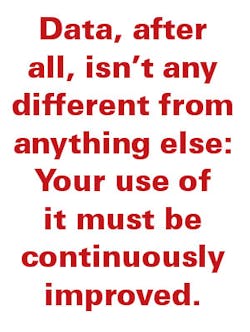Even if you think you understand the data you use to run your business, you can do better. Whether we're talking about understanding market data, plant floor metrics or the motherlode of government reports that track the state of the U.S. economy, the need exists to question and dig deeper for a more clear understanding.
Data, after all, isn't any different from anything else: Your use of it must be continuously improved.
Contributing author Larry Fast knows there's a problem even within factories that have tracked production metrics for decades. In a recent series about selecting metrics to drive continuous improvement, he several times notes shortcomings in factories he's toured. It was Larry's series, along with the current political disputes about facts and our own use of data to measure audience engagement, that cause me to highlight the use—and misuse—of data.
Notably, Fast carefully explains the environment that he's talking about; this makes clear (or should) that in different situations, other metrics would be used. As well, though he offers a list of areas that are likely candidates for tracking, he doesn't dictate. Instead, he recommends that leaders review their particular plant or situation and ask themselves: "Are you measuring the correct things and receiving actionable reports from those responsible?"
He suggests digging deeper into what you think you know, by challenging current metrics and trying to identify new metrics that are needed to drive improvement. Further, he suggests that you engage your staff in this review process—both to help them better understand the data and to help you understand what they need.
Making this matter urgent is the step-change in the type, quantity and frequency of data we're expected to process—and act on—each day to drive our businesses. With the coming of the Internet of Things and the related increased use of automated data collection and analysis, our approach to data must adapt.
Leveraging artificial intelligence, to be sure, will play a role in helping, but it is not a substitute for human analysis. Indeed, AI comes with its own demands on you and your staff.
My big concern is that, as data become ubiquitous, it's critical to understand where and how it was collected. Too often, I see reports that purport to measure something, but a detailed review exposes a flaw in how it was collected, compiled, interpreted or reported. Other times, I see plants continue to gather and report data that are no longer needed. At other times, I see calculations that are flawed.
Nothing good has ever come from making a decision based on bad data, the wrong data, or an incorrect interpretation of good data. Yet, executives and staff at all levels are increasingly at risk of doing so. Don't let that happen to you.
About the Author
Patricia Panchak
Patricia Panchak, Former Editor-in-Chief
Focus: Competitiveness & Public Policy
Call: 216-931-9252
Follow on Twitter: @PPanchakIW
In her commentary and reporting for IndustryWeek, Editor-in-Chief Patricia Panchak covers world-class manufacturing industry strategies, best practices and public policy issues that affect manufacturers’ competitiveness. She delivers news and analysis—and reports the trends--in tax, trade and labor policy; federal, state and local government agencies and programs; and judicial, executive and legislative actions. As well, she shares case studies about how manufacturing executives can capitalize on the latest best practices to cut costs, boost productivity and increase profits.
As editor, she directs the strategic development of all IW editorial products, including the magazine, IndustryWeek.com, research and information products, and executive conferences.
An award-winning editor, Panchak received the 2004 Jesse H. Neal Business Journalism Award for Signed Commentary and helped her staff earn the 2004 Neal Award for Subject-Related Series. She also has earned the American Business Media’s Midwest Award for Editorial Courage and Integrity.
Patricia holds bachelor’s degrees in Journalism and English from Bowling Green State University and a master’s degree in Journalism from Ohio University’s E.W. Scripps School of Journalism. She lives in Cleveland Hts., Ohio, with her family.



